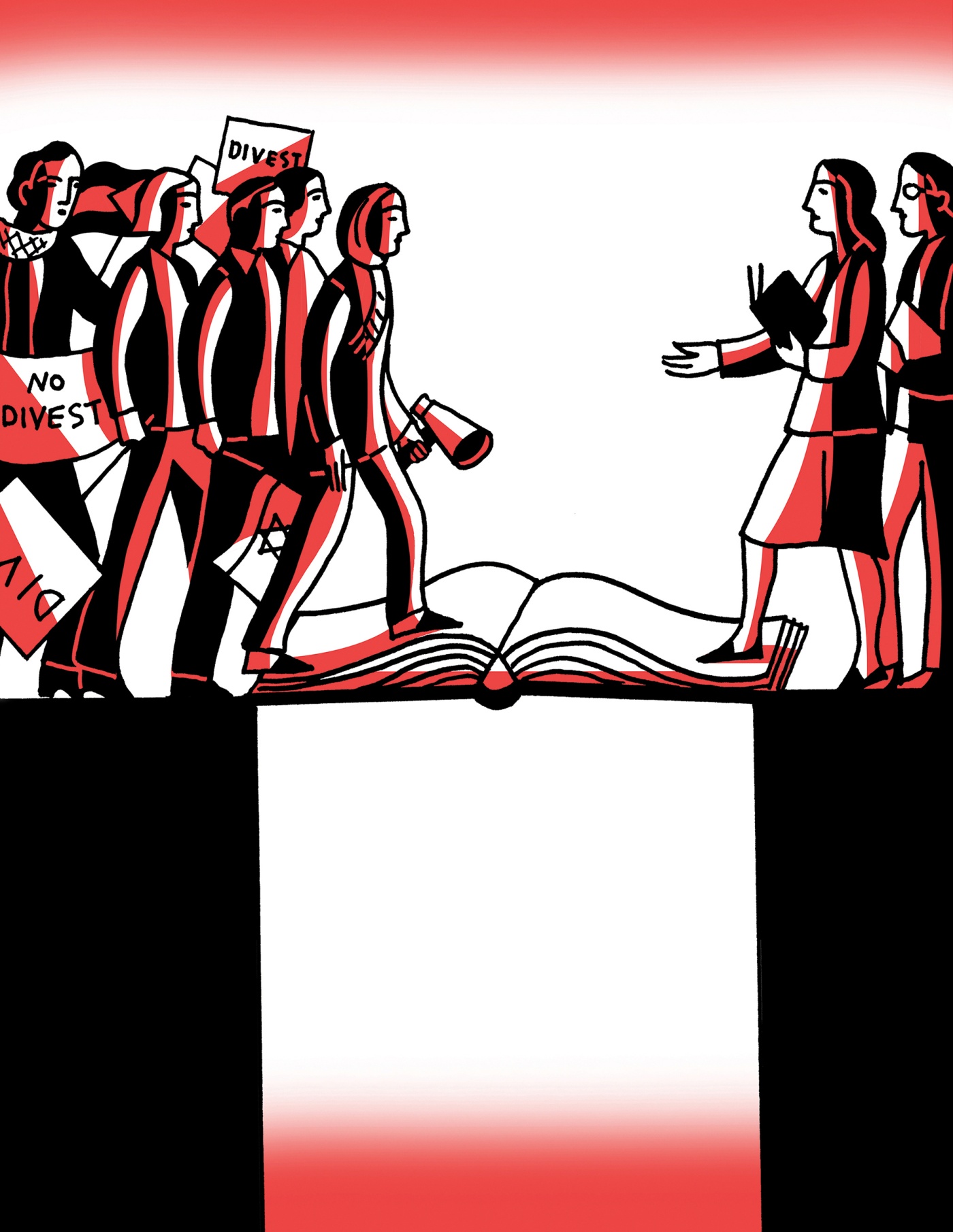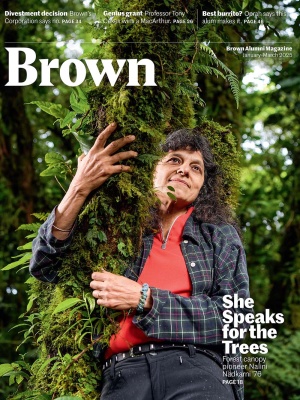An End to the Divestment Question?
After a year marked by student protests, and with the community still divided, the Brown Corporation closed the chapter on the issue of whether the University would divest from companies doing business with Israel. A flourishing of scholarship centered on the Middle East may bring new beginnings.

The argument over whether or not Brown should divest its endowment holdings from certain companies doing business in Israel is many decades old—most recently, the campus chapter of Students for Justice in Palestine (SJP) was founded in 2009 and mounted its first (failed) divestment campaign in 2011. Since the beginning, there has also been strong opposition. Christina H. Paxson, Brown’s president since 2012, for years maintained that calls to divest Brown from companies that student activists said “enable war crimes in Gaza” did not meet Brown’s established standard for divestment. In 2019, after 69 percent of undergraduates voted for divestment in an Undergraduate Council of Students (UCS) poll, the University-appointed Advisory Committee on Corporate Responsibility in Investment Policies (ACCRIP) formally recommended divestment. Paxson declined to bring this before the Corporation, Brown’s highest governing body, writing that “Brown’s endowment is not a political instrument to be used to express views on complex social and political issues, especially those over which thoughtful and intelligent people vehemently disagree.”
Then came the Hamas-led massacre of Israeli civilians on October 7, 2023. Over the next months, as Palestinian deaths mounted into the tens of thousands and Israeli hostages were killed or remained in captivity, the disagreement over divestment became ever more vehement. At Brown, pro-divestment student activists staged sit-ins (resulting in a total of 61 arrests for trespassing), a hunger strike, and an encampment on the College Green. In late April, 2024, Paxson agreed to bring the issue to a Corporation vote in the fall. She hoped, she said then, that a vote would “bring clarity to a matter of longstanding interest to many members of the community.”
On October 9, one month into the fall semester, a light breeze whipped newly fallen leaves in the narrow pathways on campus as students made their way to class, midterms looming. Tensions were low, activism on pause. Students for and against had made presentations to ACCRIP’s successor, the Advisory Committee on University Resources Management (ACURM), which had yet to release its recommendation. The Corporation wasn’t expected to meet until later that month.
The email arrived in campus inboxes around lunchtime: In a special session held ten days before its regular fall meeting, the Corporation had examined ACURM’s recommendation—which, the campus now learned, had been to vote against the student proposal to divest. The Corporation had agreed: Brown would not divest. The University’s mission “is to discover, communicate, and preserve knowledge. It is not to adjudicate or resolve global conflicts,” reads the Corporation’s statement. Furthermore, it observes, there are “sharply divergent views” among the Brown community on the long-
running conflict in the Middle East, reflecting “the lived experiences of Brunonians—Israelis and Palestinians, Muslims and Jews, and numerous others.” It also notes that “Brown has no direct investments in any of the companies targeted for divestment, and that any indirect exposure for Brown in these companies is so small that it could not be directly responsible for social harm, as defined in ACURM’s charge.”
“I’m fighting for my family”
Pro-divestment activists said they expected the Corporation’s “no” vote but were caught off guard by the timing and stunned by ACURM’s interpretation of its charge regarding social harm (more on that below). On its Instagram page, Brown Divest Coalition (BDC)—the student group that had submitted the divestment proposal—soon posted an image of the no-divest announcement scrawled with red hand-written letters. “Free Palestine,” it proclaimed, after directing an expletive toward both Paxson and the Corporation.
“It’s about more than divestment,” BDC member Aboud Ashhab ’25, who grew up in the West Bank of Palestine, told the Brown Daily Herald (BDH) after the decision. “I’m fighting for my family. I’m fighting for my friends back home, for their right to life and for their right to dignity.” Ashhab had previously told BAM about his personal experience being tear-gassed by Israeli forces—gas, he says, that was supplied by Safariland, a U.S. company on the divestment list.
On October 18, about 150 protesters with Brown’s chapter of SJP gathered, chanting slogans as Corporation members came out of their meetings. Two days later, the University suspended the 15-year-old student organization pending an investigation into alleged “threatening, intimidating, and harassing actions” during the protest. Students interviewed who participated acknowledged there was a high level of intensity that day due to outrage at the decision but deny knowledge of a racial epithet, one of the charges. Brown spokesman Brian Clark says he could not “speak to whether this happened or didn’t happen” and said the details would come out in the student conduct evaluation process.
“The University has debilitated one of the only organizations on campus that’s actively making space to grieve the lives lost in Gaza,” says Arman Deendar ’25, a member of BDC. “It feels like this past month has been just one devastating setback after another.”
“My fear is everything’s going to boil back up”
“Everyone always knew the University would say no to divestment,” Rabbi Josh Bolton, executive director of Brown RISD Hillel, told the BAM after the vote, but he says he got no relief from it. “Over the past year, Jewish students were maligned on campus,” he says, characterizing that maligning as one of the “victories” of the divest movement, despite the movement’s many Jewish participants at Brown. “Rhetoric that was inconceivable in seasons prior became normalized and friendships were ended because of real or perceived commitments to Zionism.”
“The discussions are rather heated. There are occasional tears. But all in all there is respect and intellectual curiosity that prevail.”
Brooke Verschleiser ’25, president of Brown Students for Israel (BSI) and coauthor of an anti-divest proposal students submitted to ACURM, also says the movement has had harmful consequences. “Increases in forms of anti-Zionist activity, which have become a near constant at this point at Brown, are ultimately shown to lead to increases in antisemitism,” she wrote in a BDH op-ed after threatening emails were sent to Hillel leadership last spring.
“Can you imagine the rightful public outrage that would ensue if the head of the LGBTQ Center or Brown Center for Students of Color received such threats against them and their families? At the same time that antisemitism has skyrocketed across the globe, it has increasingly become normalized.”
Verschleiser was herself targeted. She has an Israeli flag hanging at her apartment and one day found a note at her door that read “those who stand for death will die by their own hands.” Her response to the Corporation vote is mixed. “It got up to the highest authority of people and they made the decision, so in that sense it’s a done deal,” she says. “But my fear is everything’s going to boil back up.”
The weight of symbolism
In their interrogation of the Corporation’s decision, few pro-Palestinian activists frame the question of divestment as one of “adjudicating a global conflict”—for them, it’s a matter of principles in the face of more than 43,000 Palestinian deaths since October 7, 2023.
For some, that’s deeply personal. “Multiple members of my extended family have died in the past few days,” a student of Palestinian descent wrote to the BDH in a message published on October 13, 2023. “The ones who are still alive have had their homes destroyed, they have no food and no water, and nowhere to go.” Others point to international censure. At one of four forums ACURM used to solicit comments on the divestment proposal (it also received more than 3,700 emails), community members spoke of their horror at the devastation. One community member pointed out that the “International Criminal Court has filed arrest warrants for Israeli leaders citing war crimes and crimes against humanity.”
Similarly, ACCRIP’s 2020 report recommending divestment spoke of “a firm point of agreement among groups with otherwise irreconcilable differences” on campus that Palestinians were experiencing “social harm,” adding, “This mirrors the consensus in the international community and among human rights groups.”
Activists object to ACURM’s interpretation of its charge as being to consider divestment action only “when the investment or expenditure of University resources directly causes ‘social harm.’” That, two of ACURM’s eleven members said in its report, is “unreasonably narrow.” And, says Deendar of BDC, “The people who originally formed ACURM were completely surprised about this interpretation of the charge. Under the new definition of ‘social harm’ it’s difficult to envision any case where [ACURM] would recommend divestment.”
Another objection from pro-divestment activists hinges on a different aspect of the Corporation’s language—the part saying divestment would be a “symbolic statement.” For them, the word “symbol” has a very different meaning: one of power, not insignificance. Ashhab argues the amount of money invested or the amount of “direct harm” that can be determined shouldn’t be the deciding criteria. “Using that logic, it really discounts any other previous divestment that was decided on moral grounds,” he said. “Any form of divestment is symbolic. The symbolism is still important.”
A Brown faculty member who asked not to be named says they were confounded by the Corporation’s dismissal of the proposal as a mere symbol. “That’s what makes Brown great,” they say. “It has a commitment to the humanities and liberal arts, a commitment to the idea that conceptual production is meaningful. Symbolic thinking is operative in the world. That’s what makes us human.” Another faculty member rejected the idea of “symbolism” to describe $66 million in investments (see sidebar). “My peer scholars in Gaza have been murdered along with their families by bombs produced by companies in which Brown invests,” he said at an ACURM forum. “These are material, these are lives being extinguished using tools in whose production Brown invests.”
The right to self defense
Meanwhile, Verschleiser of BSI says divestment would “largely be symbolic” in the sense that withdrawing these indirect investments would have minimal impact. In its paper, the group argues further that the divestment movement “fails to take into account the geopolitical realities that Israel faces, Israel’s responsibilities to its citizens, and whether alternative policies might create more social harm…. It is a fundamental principle of both international law and broader systems of ethics that nations have a right to defend themselves against threats to their existence.”
For many Israeli and American Jews, bearing witness to the largest slaughter of Jews since the Holocaust was excruciating. “When the videos of Hamas terrorists brutalizing Israeli civilians started circulating, I started having panic attacks and just broke down. I couldn’t process what I was seeing,” an Israeli student wrote in a message to the BDH that was published a week after October 7.

While pro-divestment actions garnered the biggest headlines of the past year, there were many anti-divestment voices on campus, too. At an ACURM forum, a first-year student said two of his Israeli cousins had been taken hostage on Oct. 7 and subsequently murdered. “Anyone who sees a humanitarian crisis on one side only does not see the full picture of harm,” he argued. “Voting for divestment chooses this narrow perspective … and would cause great harm to me and many others both in Israel and on this campus.”
Divestment “seeks to disarm Israel in defending itself against Hamas, Hezbollah, Iran, and others who have publicly sworn to kill Jews and destroy the state of Israel,” said an alumnus from the class of 1983 at the forum.
“Maybe we should also target states like Texas, where abortion is restricted, leading to potential divestments from major companies including Dell Technologies, Hewlett Packard, and Tesla?” asked another ACURM speaker.
Prominent Brown donor and then–Corporation member Joseph Edelman published a September op-ed in the Wall Street Journal decrying Paxson’s decision to allow a vote—the first at an Ivy League institution—characterizing it as a referendum on whether Israel has the right to exist. “I consider the willingness to hold this vote a stunning failure of moral leadership at Brown University,” he wrote. “I hereby resign.”
Brown defends its divestment process as responsive to its community, its educational mission, and its duty to “interrogate difficult questions,” says spokesperson Brian Clark. “Far from a direct response to current activism,” Clark says, “Brown is following an established process that is nearly a half-century old and…built on the principle that Brown has an obligation to examine and investigate claims challenging its moral responsibility.”
What’s next?
The debate about what Brown should stand for is far from over. At a December faculty meeting, Kristina Mendicino, chair of the Faculty Executive Committee, announced the creation of a Committee of Institutional Values and Voice, charged with developing a statement of values for Brown. Members will include faculty, administrators, and students. “On the one hand, ACURM is being asked to make decisions about morals and ethics and values,” Mendicino was quoted as saying in the BDH. “On the other hand, Brown has no value statement to clearly define what those values are.”
But the campus was calm as winter break approached. A majority of students who vote in UCS referendums may consistently vote in favor of divestment, but they are still a minority—only 30 to 40 percent of undergraduates typically participate, and undergrads make up only two-thirds of the student body. The rhetoric has been fiery at times, but many community members are not actively engaged in the issue.
While some students who vehemently disagree on the issues may have drawn apart, Jewish students who are non-Zionist have found new ways to connect. “I came to Brown assuming I would suck it up like I always have and go to Hillel, or the regular Zionist, Jewish spaces,” says Ifadayo Engel-Halfkenny ’27. But he found community with Jews For Ceasefire Now (JFCN), which has incorporated Jewish culture in its pro-Palestinian actions since its inception in November 2023. Members have held their own weekly Shabbat dinners, a Passover seder, and High Holiday services. And while SJP is forbidden to gather, other pro-divestment activists told BAM they were “regrouping.” Earlier, a Palestinian student told the BAM she was encouraged by the large amount of support from non-Palestinians that recent activism had garnered.
At Hillel, which posts an anti-divest statement on its website, Rabbi Bolton rejoiced at a “positive Jewish ambiance” on campus in an email sent November 1, quoting a current parent: “Just returned from Brown Family Weekend. It was wonderful! No protests, no posters, no rallies, no chanting. ... Jewish life at Brown is thriving. The weekend renewed my faith in Brown.”
Meanwhile, there is one place where many students with sharply differing opinions are coming together. Fittingly for Brown, it’s the classroom. The number of courses examining the Middle East has mushroomed, with more than 25 listed for the 2024/25 school year exploring topics as various as Middle Eastern dance, the 19th-century Arabic cultural renaissance known as the Nahda, and the Ottoman Empire.
Among courses offered this spring, many for the first time, are “Antisemitism and Modern History,” “Between the River and the Sea: Political Concepts from Israel/Palestine,” and “Jews & Muslims: Their Contacts Through the Ages.” Established classes such as “Israel-Palestine: Lands and People,” taught by Omer Bartov, the Samuel Pisar Professor of Holocaust and Genocide Studies, have seen an uptick in enrollment.
Katharina Galor, Hirschfield Senior Lecturer in Judaic Studies, created a seminar that ran for the first time this fall: “Israel-Palestine: Public Humanities.” She designed it to use examples from visual and performing arts to show how artistic expression “can foster dialogue as well as controversy.”
Halfway through the semester, Galor—an Israeli art historian and archaeologist who studies the “visual and material culture” of Israel and Palestine and has published books with a Palestinian-born collaborator (see “Eye to Eye,” Sept.-Oct. ’24)—said the seminar is “probably the most emotionally tiring seminar I’ve taught in 28 years of teaching, but also the most rewarding.” She decided to create it soon after October 7. As an expert in the history and culture of the region, she noticed people on campus claiming a position with a lack of knowledge. She wanted to create a space where students could learn about different perspectives and deconstruct assumptions, misconceptions, and stereotypes. “The arts, especially as they relate to Israel-Palestine, are my expertise,” she says. “And I felt this is where I can contribute.”
Galor says her students include an Egyptian, an Iraqi, an Eritrean, as well as several Jewish students and an Israeli who served in the Israeli Defence Forces. “The discussions are rather heated,” she says. “There are occasional tears. But all in all there is respect and intellectual curiosity that prevail.”
Additional reporting by Haley Sandlow ’25, Louise Sloan ’88, and Pippa Jack.




